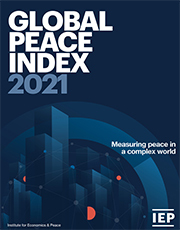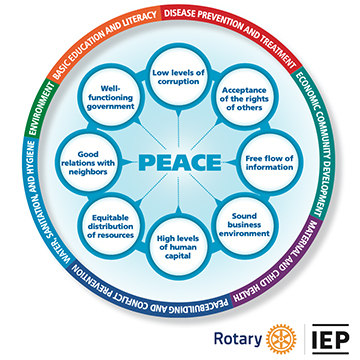By Michael Collins, Executive Director Americas, Institute for Economics and Peace

In June, the Institute for Economics and Peace (IEP) released its 15th annual Global Peace Index, one of the leading measures of peacefulness globally. Since 2017, the IEP and Rotary have been in a strategic partnership, providing members with new tools to effectively build peace in communities around the world. It has been my pleasure to work with Rotary members as I have been involved in the process of creating a number of global peace indexes.
What can we glean from the latest report? Well, there’s good news and bad news. Overall, the 2021 Global Peace Index reveals a world in which decades-old conflicts are beginning to abate. But at the same time, civil unrest and political instability are creating new challenges as the world looks toward a recovery from the COVID-19 pandemic. For the ninth time in 12 years, the level of global peacefulness has declined, but it was also the smallest decline recorded by the index.

Peace is much more than the absence of violence. The Rotary Positive Peace Academy introduces the concept of Positive Peace, which describes the attitudes, structures, and institutions that underpin and sustain peaceful societies. The IEP has developed a conceptual framework, known as the Pillars of Peace, that outlines a system of eight factors that work together to build positive peace. Derived from a statistical analysis of over 24,000 datasets, the Pillars of Peace provides a roadmap to overcome adversity and conflict, and to build lasting peace.
The report also notes that peace deteriorates more rapidly than it can be built. While this may be disheartening for some, I see it as a beacon, a challenge that Rotary members have met head on for more than 100 years as they embrace peace as a cornerstone of Rotary’s humanitarian mission.
In order to help make the concept more tangible for members, Rotary created the Positive Peace Activator Program in 2020. By 2024, 180 new Positive Peace activators will be trained in six regions of the world. They complete a 20-hour training program and emerge ready to work with clubs and districts as project consultants, trainers, and speakers at Rotary events. Today there are cadres of activators in the U.S., Canada, Latin America, and Europe. Training will begin soon in Africa and Asia.
While peace is a complex issue, we’ve never had so many tools and as good a framework to measure our progress. Please join us as we continue to build on our partnership to create a lasting and positive impact on communities around the world.
Learn more about the Rotary-IEP Partnership or contact project coordinator Summer Lewis.
https://blog.rotary.org/2021/07/16/what-the-latest-iep-report-says-about-world-peace/
